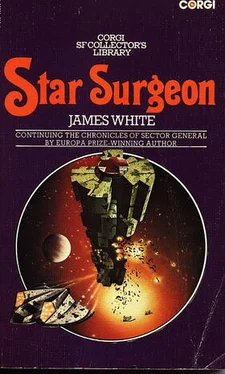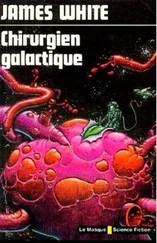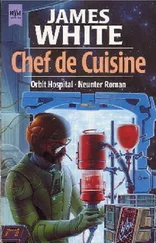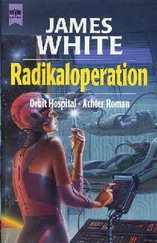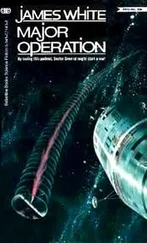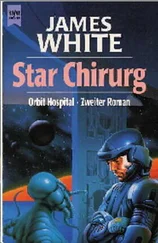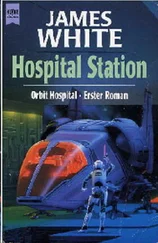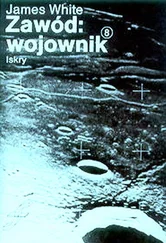They climbed into their operating suits-regulation light-weight pattern except that the arms and hands sections ended in a fine, tight-fitting sheath that was like a second skin. The air was replaced by the patient’s atmosphere and they began cutting it out of its suit.
The TRLH had a thin carapace which covered its back and curved down and inward to protect the central area of its underside. Four thick, single-jointed legs projected from the uncovered sections and a large, but again lightly boned head contained four manipulatory appendages, two recessed but extensible eyes and two months, one of which had blood coming from it. The being must have been hurled against several metal projections. Its shell was fractured in six places and in one area it had been almost shattered, the pieces being severely depressed. In this area it was losing blood rapidly. Conway began charting the internal damage with the X-ray scanner, then a few minutes later he signaled that he was ready to start.
He wasn’t ready, but the patient was bleeding to death.
The internal arrangement of organs was different from anything he had previously encountered, and different from anything in the experience of the six personalities sharing his mind. But from the QCQL he received pointers on the probable metabolism of beings who breathed such highly corrosive air, from the Melfan data on the possible methods of exploring the damaged carapace, and the FGLI, DBLF, GLNO and AACP contributed their experience. But it was not always helpful-at every stage they literally shrieked warnings to be careful, so much so that for seconds at a time Conway stood with his hands shaking, unable to go on. He was probing the recorded memories deeply now, hitherto it had only been for data on language, and everything was coming up.
The private nightmares and neuroses of the individuals, triggered off by being so inextricably mixed with the similar alien nightmares around them, and all mounting, growing worse by the minutes. The beings who had produced the tapes did not all have e-t hospital experience, they were not accustomed to alien points of view. The proper thing was to keep reminding himself that they were not separate personalities, Conway told himself, but merely a mass of alien data of different types. But he was horribly, stupidly tired and he was beginning to lose control of what was going on in his mind. And still the memories welled up in a dark, turgid flood. Petty, shameful, secret memories mostly concerned with sex-and that, in e-ts, was alien, so alien that he wanted to scream. He found suddenly that he was bent over, sweating, as if there was a heavy weight on his back.
He felt Murchison gripping his arm. “What’s wrong, Doctor?” she said urgently. “Can I help?”
He shook his head, because for a second he didn’t know how to form words in his own language, but he kept looking at her for all of ten seconds. When he turned back he had a picture of her in his mind as she was to him, not as a Tralthan or a Melfan or a Kelgian saw her. The concern in her eyes had been for him alone. At times Conway had had secret thoughts of his own about Murchison, but they were normal, human thoughts. He hugged them to him tightly and for a time he was in control again. Long enough to finish with the patient.
Then suddenly his mind was tearing itself apart into seven pieces and he was falling into the deepest, darkest pits of even different Hells. He did not know that his limbs stiffened or bent or twisted as if something alien had separate possession of each one. Or that Murchison dragged him out and held him while Prilicla, at great danger to life and its fragile, spidery limbs, gave him the shot which knocked him out.
The intercom buzzer awakened Conway, instantly but without confusion in the pleasant, familiar, cramped surroundings of his own room. He felt rested and alert and ready for breakfast, and the hand he used to push back the sheets had five pink fingers on it and felt just right that way. But then he became aware of a certain strangeness which made him hesitate for a moment. The place was quiet …
“To save you the where-am-I-what-time-is-it? routine,” O’Mara’s voice came wearily, “you have not been consciously with us for two days. During that time, early yesterday, to be exact, the attack ceased and has not yet been resumed and I did a lot of work on you. For your own good you were given a hypno treatment to forget everything, so you will not be eternally grateful for what I’ve done for you. How do you feel now?”
“Fine,” said Conway enthusiastically. “I can’t feel any … I mean, there seems to be plenty of room in my head …
O’Mara grunted. “The obvious retort is that your head is empty, but I won’t make it.”
The Chief Psychologist, despite his attempt to maintain his usual dry, sardonic manner, sounded desperately tired-his words were actually slurred with weariness. But O’Mara, Conway knew, was not the type who became tired-he might, if driven long and hard enough, succumb to mental fatigue …
“The fleet commander wants a meeting with us in four hours time,” O’Mara went one, “so don’t get involved with any cases between now and then. Things are running fairly smoothly now, anyway, so you can afford to play hooky for a while. I’m going to sleep. Off.”
But it was very difficult to spend four hours doing nothing, Conway found. The main dining hall was jammed with Corpsmen-projector crews engaged on hull defense, replacements for the defending ships, maintenance men and Medical Division personnel who were supplementing the civilian medical staff. Conversation was loud and nervous and too cheerful, and revolved around the past and possible future aspects of the attack.
Apparently the Monitor force had practically been pushed down onto the outer hull when an e-t force of volunteer Illensans had emerged from hyperspace just outside the enemy globe. Illensan ships were big and badly designed and looked like capital ships even though they only had the armament of a light cruiser, and the sight of ten of them popping out of nowhere had put the enemy off his stride. The attacking force had pulled back temporarily to regroup and the Monitors, with nothing to regroup with, were concentrating on increasing the armament of their last line of defense, the hospital itself. But even though it concerned him as closely as anyone else in the room, Conway felt averse to joining in the cheerfully morbid conversations.
Since O’Mara had erased all the physiology tapes and indulged in some curative tinkering with his mind, the nightmare of two days ago and the e-t language data he had gained had faded, so he could not indulge in polite conversation with the e-ts scattered about the hall. And the Earth-human nurses were being monopolized by Corpsmen, usually at the rate of ten or twelve to one, with an obvious improvement in morale in both directions. Conway ate quickly and left, feeling that his own morale was in need of improvement, too.
Which made him wonder suddenly if Murchison was on duty, off duty or asleep. If she was asleep there was nothing he could do, but if she was on duty he could very soon take her off it, and when she was off …
Strangely he felt only the slightest prick lings of conscience over this shameless abuse of his authority for his own selfish ends. In time of war, he thought, people became less bound by their professional and moral codes. Ethically he was going to the dogs.
But Murchison was just going off duty when he arrived in her ward, so he did not have to openly commit the crime he had been intent on committing. In the same loud, too-cheerful tone that he had considered so artificial when he had heard it in the dining hall he asked if she had any previous engagement, suggested a date, and muttered something horribly banal about all work and no play …
Читать дальше
